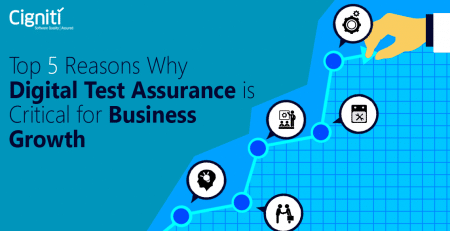Is Open Source Testing influencing Digital Transformation efforts?
Years ago, a very few would have believed that a software application could help to conceptualize an entire global business idea, and become a corporate sensation. Brands such as Amazon, Uber, AirBnB, Ola, Flipkart, and Alibaba have reinvented the way businesses could ever apply and harness Digital Technologies. Some may call it a disruption, or some may endorse it as innovation; Software centric business model is the corporate fact and tool that no one can escape today. But what does it take to become a sensation? Success of a software-centric model can be attained with a sound software development and testing strategy that can boost agility, and induce innovation all the way.
There are numerous perspectives around Digital Transformation, Software Development methodologies, and Software Testing strategies. In line with the growing need for agility, flexibility, and effectiveness, businesses have been increasingly adopting Open Source Development and Testing strategy. While we all are aware of its intrinsic benefits, how do we gauge the strengths of an Open Source testing strategy in the light of the ongoing Digital Transformation initiatives?
What’s so distinct about an Open Source strategy?
The tussle between Open Source platforms and licensed tools continues to create a rift amongst experts as well as practitioners. The core concept of Open Source is to offer community-based assistance, flexibility, business agility, and positively cost-effectiveness. Considering these core competencies, Open Source technology and platforms have found a key position in the transformation processes for enterprises.
Amongst all the competencies, Open Source offers Community-driven solutions and support. This in many ways ensures quality, as nothing is constant, there is always a new perspective of looking at issues/bugs and resolving the error. At the same time, speed is ensured, as there is no definite hierarchy to follow, and the code goes through rigorous review all the time.
Moreover, an Open Source strategy boosts open channels of communication and transparency. There is more acceptance of new ideas to resolve issues, which gives scope for building better methodologies. Openness and acceptance is very much necessary for successfully delivering Digital solutions. For instance, an entertainment provider needs to facilitate an update on its application and roll out a campaign in real time. Hence, if there is an issue, it needs to get salvaged in real-time. The team cannot wait for training and then study the error at hand.
It is equally critical to consider the other side of adopting Open Source technology platform. It lacks accountability, as it is freely available, so no one is particularly answerable to you. There are no definitely protocols or training schedules for teams, as training is self-driven. Hence, the decision to take up this route has to be totally objective-based and depending on the requirements of your project.
How can Open Source Testing influence your Digital Transformation strategy?
Any tool or platform can work for a team or a project only when its features are aligned with the objectives of the project. It is critical to do this specifically with Digital Transformation initiatives, as these projects/applications need speed and assured quality.
Apart from influencing, how can an Open Source Testing strategy impact your Digital Transformation strategy?
Open-Source platforms provide the ability to constantly check for issues, record the errors, and even monitor the errors objectively from outside the system. Data can be collected externally and applied for deriving the expected outcome. This helps in detecting the faults and managing them on time. Also, saves unnecessary rework costs at a later stage.
Digital Technologies need constant testing and development, hence continuous integration as well. When the code is out for rigorous tests, it helps to not only detect issues, but keep the application under scrutiny and ensure effective integration at the end. Open Source automation tools enable teams to ensure Continuous Testing and Development, and ultimately successful integration. This is absolutely necessary while rolling out and even maintaining Digital applications.
Everything works well when it is aligned with a proper strategy and business relevance. Hence, all the impending flaws with Open Source can be managed if the strategy is fool-proof and well-orchestrated.
It makes all the overall testing process measurable, as various testing aspects have to be measured and managed. For instance, the number of contributors, the issues resolved, the bugs detected, etc. This positively adds value to the overall testing and development ecosystem. Even at an organizational level, the strategy creates an impact with less licensing costs, added speed and minimal legal implications on the business.
With transparency and open channels of communication, the community and the testing teams are able to develop better testing practices and update existing frameworks. These assets can add value and keep upgrading as other projects evolve and complete, thus, the cycle continues. Better testing methodologies and success path for the future can definitely enhance the RoI, especially, where the investments are bare minimal.
Nonetheless, it is absolutely critical that you keep your legal team looped in to avoid any plagiarism of code or frameworks, which might endanger your company or your employee’s contributions to the project.
The Gartner 2018 CIO Agenda Industry Insights report shows that all industries rank digital business as one of their top 10 business objectives. In particular, CIOs from the banking and investment services (26%), telecom (25%) and government (18%) sectors are placing digital business/digital transformation as their number one business objective in 2018.
Digital Transformation is a race where everyone needs to get faster to the market. Only speed and quality can ensure success and stability for any brand, big or small. Open Source has its own contemporary practices and virtues that can bring value for the development and software testing cycle for Digital Transformation.
Cigniti is also an active contributor in open source platforms for test automation and is a silver sponsor of Selenium. Cigniti has also developed a host of pre-built automated test suites for industry leading 3rd party products like SAP, Oracle, PeopleSoft, Salesforce, SAP Hybris, MS Dynamics CRM, and Work Day.
Connect with us to effectively leverage Open Source tools and platforms for your Digital Transformation objectives.





Leave a Reply